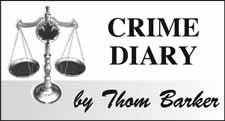In contrast to last week-"Court dry, but appealing," Crime Diary, November 27, 2013- court Monday was quite entertaining.
Unfortunately, entertaining does not necessarily mean newsworthy and I frequently walk out of court with nothing to report on. I've written at length about the difference between "in the public interest" and what the public might be interested in.
With respect to that, while the news stories may not have materialized, there is plenty I can write about. That is the beauty of Crime Diary.
I will dispense with names, even though it all happened in open court and as such is public record. If you really want to know the who as well as the what, you'll just have to come down to Smith Street and see for yourself.
A particularly entertaining moment came in an exchange between the judge and one of the defence attorneys as they tried to set a hearing date. The date the judge wanted conflicted with the lawyer's pro bono schedule. He said it was okay, though, he could get someone else to cover the pro bono work, which suited him just fine.
"That's the spirit, Mr. [attorney]," the judge quipped, which generated a fair bit of laughter.
Another surprising moment ensued when the judge was trying to explain to a defendant why he needed to get a lawyer on a driving an unregistered vehicle charge to which he wanted to plead not guilty. Confused and nervous, he dropped an F-bomb, which kind of rattled the judge momentarily and elicited a gasp from the gallery. The judge let it go.
What made the case interesting was what the judge called the "officially induced error defence," which he said is very technical. I looked it up, and it is. It basically challenges the generally held principle that ignorance of the law is no excuse.
I don't usually follow traffic ticket cases, but this one could be an exception.
As usual, which I have also written about at length, alcohol featured prominently in numerous cases. In one, a serial impaired driver got a nine-month jail sentence and three-year driving prohibition for a fourth offence in just two years.
In another, a man received $1,000 in fines for creating a public disturbance and obstructing a police officer after he interrupted the officer while he was arresting somebody else. The explanation in a nutshell, alcohol-induced agitation over police not doing something about a complaint he had made the previous evening.
Finally, there was a young man who had managed to elude police for almost four years in a break, enter and theft case. How did he finally get caught? Yep, you guessed it, picked up for being intoxicated in public.




